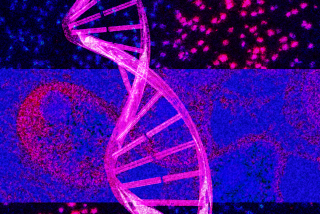Millions OKd to Analyze Backlog of Convicts’ DNA
WASHINGTON — The Justice Department awarded more than $7 million in grants Tuesday to seven states to begin clearing a large backlog of DNA genetic samples obtained from convicted criminals but never analyzed.
The grants from the department’s National Institute of Justice will allow these states to analyze 145,783 backlogged samples, out of a nationwide backlog that a national commission recently estimated at 750,000 unanalyzed samples.
The money also will pay for entering the analysis results on the FBI’s Combined DNA Index System, a computer network that allows comparisons with samples in other states.
The DNA from convicts can be compared with DNA found on evidence at crime scenes and has helped convict, and in some cases clear, suspects. Like fingerprints, DNA genetic material is specific to each individual.
The seven states also will use the money to enter DNA analyses of evidence from unsolved crimes to CODIS.
“In many cases, investigators are working hard to solve cases where a perpetrator has been apprehended for another crime and is already incarcerated,” said Julie Samuels, acting institute director.
“These grants will help link cases to convicted offenders and help investigators devote their energy to cases where the perpetrator is still at large and a threat to the community,” she said.
Last year, the National Commission on the Future of DNA Evidence recommended that the Justice Department help states analyze existing DNA samples that had not been analyzed or entered into CODIS.
California, Florida, Minnesota, New York, Pennsylvania, Texas and Washington will share the first $7 million. The department expects to distribute another $7 million soon to 14 additional states to work on their backlogs.
“Increasing law enforcement’s ability to use DNA evidence in the fight against crime makes sense and, ultimately, gets violent offenders off our streets,” said Atty. Gen. Janet Reno.
More to Read
Sign up for Essential California
The most important California stories and recommendations in your inbox every morning.
You may occasionally receive promotional content from the Los Angeles Times.










